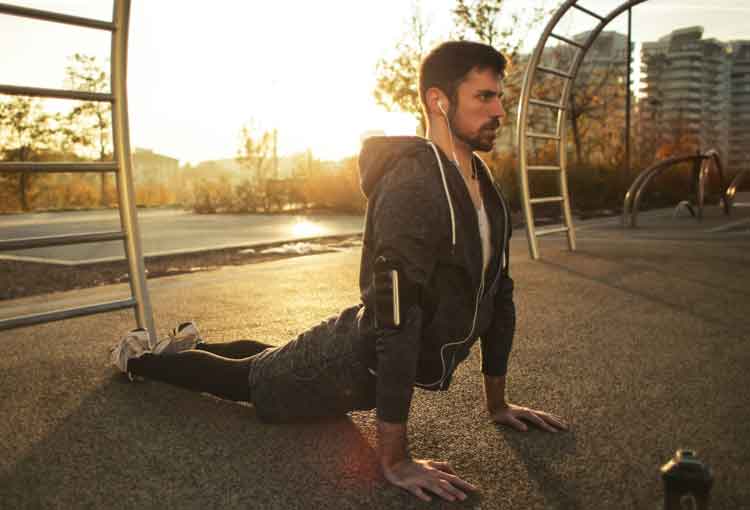Yoga is a very amazing workout because it addresses every problem related to health. At a time when the whole world is engaged in weight loss. But there are some people who are bothered to gain weight and want to be fat. Some people may eat wildly, day and night or reduce their physical activity, but they are still unable to gain weight. Maybe people who want to lose weight will see them, how lucky they are! But the fact remains that, those who are underweight are also facing health hazards in the same way as overweight people are facing. Therefore, it is very important to gain the right weight according to your height and age. That is why, in this article, we will give information about 10 yoga postures. Regular practice of this yoga with correct posture can help you in weight gain.
What Happens When You’re Underweight?
It is important to know that if you fall in the category of underweight or your BMI is below 18.5, you will be treated as underweight.
While some people may have problems with genetically underweight, others are probably underweight because they are not getting enough nutrients from food.
Sometimes, even in food, the nutrient content is not as much as it should be. There may also be two reasons for nutrient deficiency in the body. First, either lack of nutritious food. Secondly, the body is not able to absorb nutrients properly.
Nutrient deficiency affects the immune system of the body. It seems difficult for you to avoid infection and diseases. Especially when you are in the phase of recovery after surgery or prolonged illness.
If you don’t eat enough nutrients. The tissues will not repair. Also you can get flu as well as the risk of fever and pneumonia will also increase.
If you are not getting enough calories from food, it can hamper renal, cardiovascular, gastrointestinal, endocrine and central nerve system. Nutrient intake not only nourishes these important parts of the body but also improves the quality of your skin and hair.
Sometimes you can experience fatigue and discomfort when you are underweight. At times, man does not have the courage to make a detour to the park. In addition, low stamina as well as lack of confidence may also have to be faced in this situation. When you maintain an ideal weight, you can feel more energetic.
How Does Yoga Helps You In Weight Gain?
Yoga works on many problems such as weak metabolism, stress, loss of appetite and digestion problems. Regular practice of yoga also helpful for natural weight gain and ensures that you can achieve your weight goal.
Yoga increases the circulation of oxygen and blood in the body and also helps in absorption of nutrients. It strengthens the muscles and makes it resilient. Apart from that it also boost stamina.
It is very important to remember that yoga mainly works to regulate your metabolism. However, these rugs can also be done when you are trying to make a weight loss. They work in both situations.
However, you must keep in mind that complicated yoga poses should be practice under the supervision of a trained yoga trainer. In addition, it is also very important to use nutritious food in these situations.
Yoga increases the flow of energy in the body and internally purifies the body. It can not only reduce obesity but also effective for natural weight gain. If you are a victim of underweight, you can take the help of yoga. These actions will also increase your appetite, which will also increase the body mass.
Apart from body mass index (BMI) yoga also strengthens the immune system, muscles and bones. One thing needs to be seriously understood about yoga is that breathing is utmost importance in yoga. When breathing deeply, the stomach should thrive like a balloon and go inside like a non-air balloon.
Yoga for Weight Gain.
Here are 10 yoga poses that helps you to natural weight gain, those are;
- Shavasana or Corpse Pose.
- Bhujangasana or Cobra Pose.
- Vajrasana or Thunderbolt Pose.
- Surya Namaskar or Sun Salutation Pose.
- Pawanmuktasana or Wind Relieving Pose.
- Matsyasana or Fish Pose.
- Sarvangasana or Shoulder Stand Pose.
- Dhanurasana or Bow Pose.
- Chakrasana or Wheel Pose.
- Shirsasana or Headstand Pose.
Shavasana or Corpse Pose.
Benefits of Shavasana or Corpse Pose.
These posture relax the body completely. In addition, it increase the absorption of nutrients in the body and as a result body itself starts to be healthy.
You can resort to savasana to overcome the problem of underweight. It is an effective yoga practice, which works directly on the flow of blood and oxygen. This posture helps in the flow of blood and promotes nutrients in the body. This gives energy to the body and makes the body stronger. This posture give maximum rest to all the organs of the body.

How To Do Shavasana or Corpse Pose?
Step 1.
Lie down on the back without the support of pillow or anything. You can use a small pillow under your neck if required and close your eyes.
Step 2.
Spread your legs comfortably and give complete rest to your knees and claws. Fingers of both legs should be separated from each other.
Step 3.
Keep your hands with the body but don’t touch your body. The palms spread towards the sky.
Step 4.
Move your attention slowly towards every part of the body and relax.
Step 5.
Move your attention to the right paws and then move it to the right knee (thus moving your attention to the entire right foot and then moving your attention to the foot), gradually resting every part of the body and moving your attention to the head.
Step 6.
Breathe slow and deep and rest with every breath. With every breath that comes gives you energy and every breath that goes out gives you relaxation. Avoid excitement, quickness or anything that is coming up in your mind.
Just connected yourself with your body and mind. Devote your entire body to the earth and relax. Do not sleep while meditating on this posture.
Step 7.
After 10-20 minutes, when you reach a session of complete relax, close your eyes and turn to your right. Stay for one minute in this position. Take support of your right hand and sit down.
Step 8.
Take long deep breaths while keeping your eyes closed and gently bring your attention back to the environment and body. When you feel perfection, you can open your eyes gently.
| Read Now: 7 Yoga Poses for Intermediates |
Bhujang Asana or Cobra Pose.
Benefits Bhujang Asana or Cobra Pose.
Bhujangasan helps to overcome the problem of underweight. This posture works directly on the digestive system, thereby it improve the appetite. In addition, doing this posture keeps the metabolism right and improves breathing.
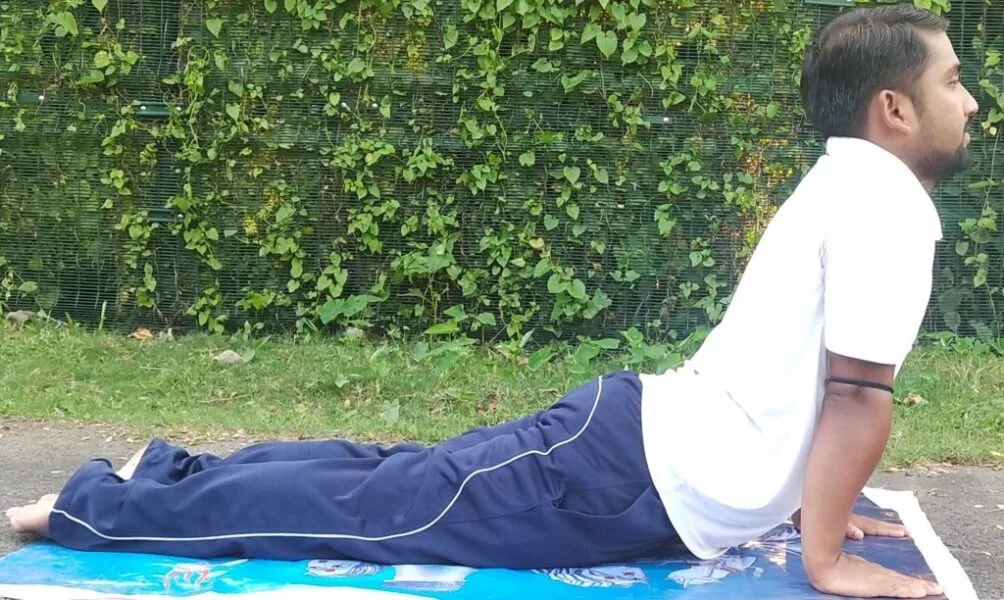
How to do Bhujang asana or Cobra Pose?
Step 1.
First, lie down on the abdomen.
Step 2.
Shorten the distance between the legs and keep them straight.
Step 3.
Now bring your palms into the shoulder.
Step 4.
Thereafter, breathe and lift the body from the chest to the navel. Maintain this state for a few seconds and gradually breathe and leave.
Step 5.
Then leave a deep breath and come down in the early stages. In this way you have to complete a cycle.
In the beginning you can do this yoga four to five times. With regular practice you can increase the number of cycle.
Vajrasana or Thunderbolt Pose.
Benefits of Vajrasana or Thunderbolt Pose.
This is the only posture that can be practiced immediately after meals. This posture works directly on the digestive system and works to control the metabolism. Moreover, this posture also calms the mind. You can practice Vajrasana to fix the problem of underweight.
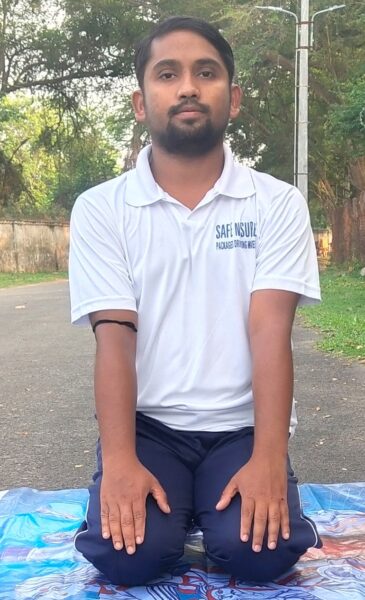
How to do Vajrasana or Thunderbolt Pose?
Step 1.
First, spread the legs on the ground. Bend the right leg with the knee and place it under the right hip.
Step 2.
Similarly bend the left leg and place it under your left hip.
Step 3.
Now bring the buttocks between the ankles.
Step 4.
Place the hands on the knees and keep the spinal cord straight. Continue the process of breathing and quitting and try to stay calm.
To come to the first stage, bring your right foot forward and then to the left.
| Read Now: 6 Best Core Strengthening Yoga Poses |
Surya Namaskar or Sun Salutation Pose.
Benefits of Surya Namaskar or Sun Salutation Pose.
You can practice Surya Namaskar to overcome the problem of underweight. Surya Namaskar is called a group of rugs, comprising 12 postures and you have to do it one after another. All these postures work together to keep the digestive system, heart health, nervous system and muscles healthy.
You can resort to Surya Namaskar to balance the declining weight. This posture also works to strengthen the immune system, which will improve your appetite habit and increase your BMI.
How to do Surya Namaskar or Sun Salutation?
Step 1.
To do this posture, first stand upright and bring the hands to the chest and keep it in the posture of salutation.
Step 2.
Take the hands up and take it to the ears while breathing. Now try to bend back.
Step 3.
Now bend the abdominal force while exhale and try to keep the palms on the ground. At the same time, try to touch the knees with a non-bending forehead.
Step 4.
In this posture, first you have to breathe and sit on the left foot and then move the right foot back. In this posture, your right knee should be put on the ground. Also try to look up by spreading the chest forward.
Step 5.
Now exhale and rear the left leg and try to lift the body from the middle. During this posture, keep the arms straight and try to get the ankles out of the ground.
Step 6.
Take the knees to the ground while breathing first while moving from Ashtangasana. Also touch the chest and chin with the surface.
Step 7.
Try to lift the upper part of the waist without breathing. Keep the palms from the ground during the posture.
Step 8.
Now try to lift the body from the middle while exhaling. Keep the arms straight during the posture and touch the ankles on the ground.
Step 9.
Take breath and bring the left foot forward and sit down. Keep your right foot straight and the right knee should be touch with the ground.
Step 10.
Exhale for this posture and bring the left leg forward and lay the palms with the ground and forehead with knees.
Step 11.
Take the hands up while breathing and try to bend back.
Step 12.
Now, finally, get straight and bring the hands to the salutation posture.
Pawanmuktasana or Wind Relieving Pose.
Benefits of Pawanmuktasana or Wind Relieving Pose.
You can also practice this posture to get relief from the underweight. This posture works well on the digestive system and controls it. Pawanmukt asana works to soothe hyperactive metabolism. In addition, it also helps in absorbing nutrients by the body in a better way. You must practice this yoga posture regularly for positive weight gain.
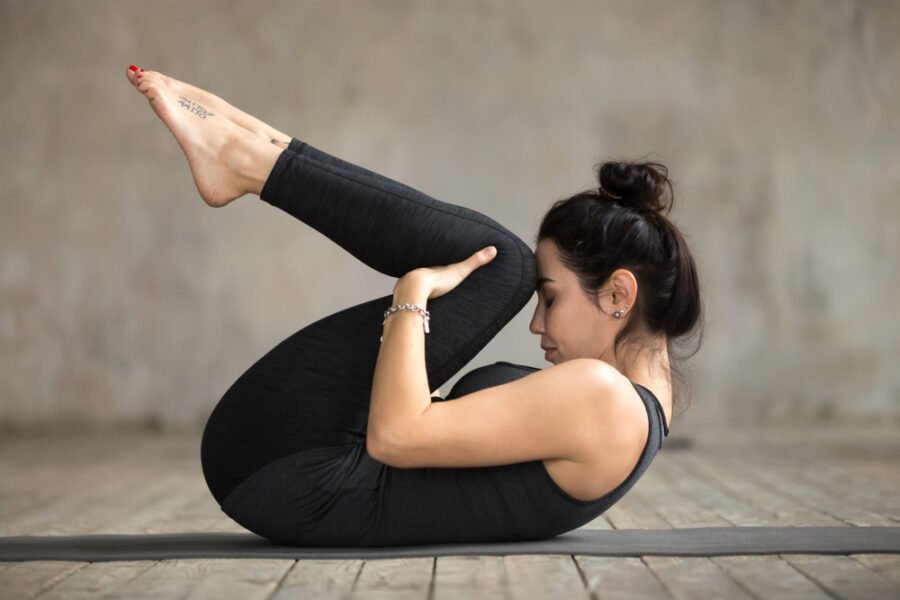
How To Do Pawanmuktasana or Wind Relieving Pose?
Step 1.
For this posture, first you lie down on the back. Your hands must be adjacent to the body.
Step 2.
Now take a deep breath and bend the right leg and hold the knees with both your hands and try to put them with the chest.
Step 3.
Now you have to raise the head while breathing and touch the nose with the knee. Stay a few seconds at this stage.
Step 4.
Now exhale and bring your feet and head to the early stages. After the process of the right foot is completed, do this posture with both the left and then with the two legs. You can do this posture four to five times.
Matsyasana or Fish Pose.
Benefits of Matsyasana or Fish Pose.
Matsyasan is a very beneficial yoga posture for weight gain. This posture works on several systems including the thyroid gland. The thyroid gland can cause weight loss and this posture works to control this gland. In addition, this posture also helps in maintaining the digestive system and metabolism as well as heart health.
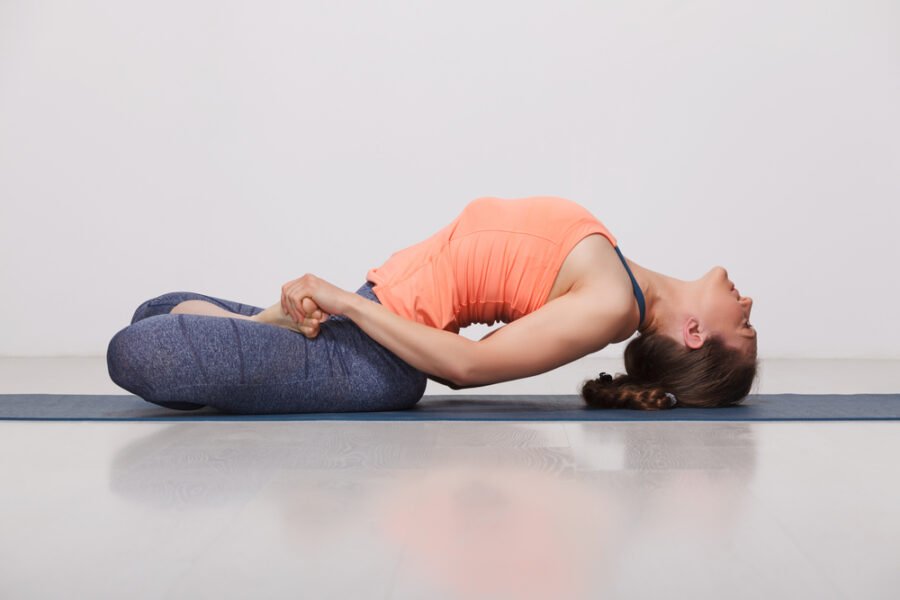
How To Do Matsyasana or Fish Pose?
Step 1.
First of all, sit in Padmaasana.
Step 2.
Now slowly start bending back and lie down on the back.
Step 3.
Thereafter, you have to hold the left foot with your right hand and the right foot with the left hand.
Step 4.
Now keep both the elbows on the ground and the knees are grounded.
Step 5.
Now move the head backwards as much as you can while breathing. At this stage, breathe slowly and release slowly.
Step 6.
Now take a deep breathe and come to the early stages. Do this cycle for four to five times.
Sarvangasana or Shoulder Stand Pose.
Benefits of Sarvangasana or Shoulder Stand Pose.
It is an effective posture to improve the flow of blood and oxygen. The better blood flow promotes nutrients in the body, thereby nourishing all parts of the body. You can practice this posture regularly for energy and strength.

How To Do Sarvangasana or Shoulder Stand Pose?
Step 1.
First of all, lie down on the back and place both hands near the shoulders.
Step 2.
Take the legs up gradually to 90 degrees.
Step 3.
Support the buttocks with palms. Straighten the body in such a way that the chin is fitted with your chest.
Step 4.
Stay in this posture for a while and then gradually come to the initial stage.
Dhanurasana or Bow Pose.
Benefits of Dhanurasana or Bow Pose.
It is an effective posture that can work to improve the digestive system, including constipation. This posture can also help you to get rid of thyroid, which can lead to weight loss. You can practice this yoga posture regularly for effective weight gain through positive absorption of nutrients in the body.
How To Do Dhanurasana or Bow Pose?
Step 1.
Lay down the abdominal force.
Step 2.
Now bend the knees and hold the ankles firmly with the hands.
Step 3.
Now breathe and lift your head, chest and thigh upwards.
Step 4.
Keep in mind that your body should look like a bow in this posture.
Step 5.
Be in this posture according to your capacity and gradually continue the process of breathing and exhaling. Come down with a long deep breath to the early stages. You can do this posture four to five times.
| Read Now: What is Magical Quantum Exercise? |
Chakrasana or Wheel Pose.
Benefits of Chakrasana or Wheel Pose.
Chakrasana is a posture that is used to force the back, which benefits the body in many forms. This posture works effectively on the digestive system, making the process of taking food and draining smoothly. In addition, this posture also helps in blood flow.
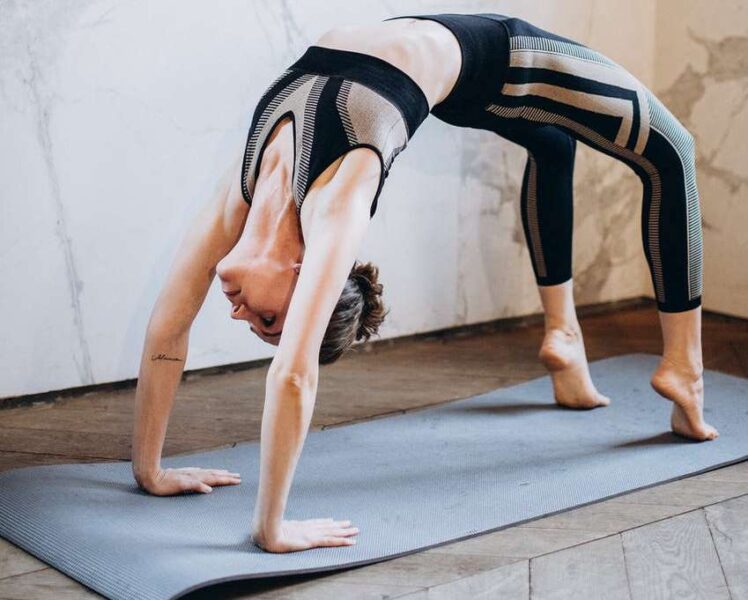
How To Do Chakrasana or Wheel Pose?
Step 1.
At first, lie down on the back.
Step 2.
Now gently bend the knees and touch your ankles with the buttocks.
Step 3.
Keep a gap of about 12 inches between your legs. Now lift your arms and bend the elbows.
Step 4.
Move the palms from the top of the head to the ground.
Step 5.
Now breathe and try to bend the back by gently raising the head. Take your arms and feet. Continue the process of breathing and quitting slowly.
Step 6.
Stay in this posture for a while. Then gradually bring down the body and lie down to come to the initial stage. You can do this posture five-six times.
Shirshasana or Headstand Pose.
Benefits of Shirshasana or Headstand Pose.
The headstand is very beneficial. It greatly benefit the thyroid, which can lead to weight loss. This posture also works to control blood operations and metabolism. You can practice this yoga posture every day to natural weight gain.
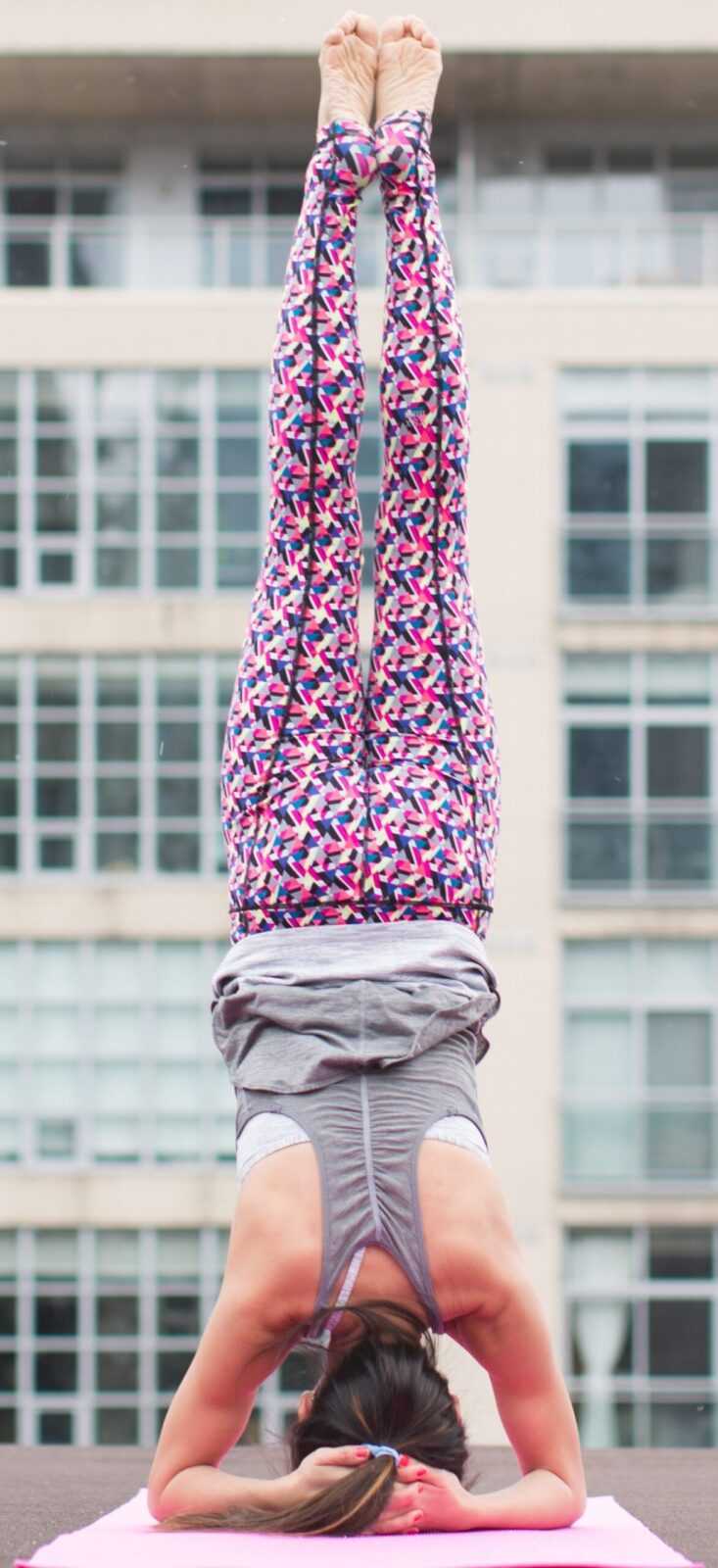
Shirshasana
How to do Shirshasana or Headstand Pose?
Step 1.
First of all, sit down by laying a yoga mat for this posture. Now trap the fingers of both hands and place your head on the fingers bending to the front.
Step 2.
Now move the legs upward and try to straighten them. Keep in mind that you have to stand on the head in this posture.
Step 3.
Stay at this stage for a while and then gently bend the knees and slowly down the legs. You can do this posture three to five times.
Bottom Line.
Before practice those weight gain yoga postures mentioned in this article, make sure that you are physically and mentally prepared to do them. If you are doing these yoga postures for the first time or are suffering from a serious disease, do it under the supervision of a yoga instructor.
To overcome the problem of underweight, all these yoga postures are effective, which can give you a quick results with regular practice.
+2 Sources
Freaktofit has strict sourcing guidelines and relies on peer-reviewed studies, educational research institutes, and medical organizations. We avoid using tertiary references. You can learn more about how we ensure our content is accurate and up-to-date by reading our editorial policy.
- Your Digestive System & How it Works; https://www.niddk.nih.gov/health-information/digestive-diseases/digestive-system-how-it-works
- Ashtangasana; https://www.tummee.com/yoga-poses/ashtangasana

 Workout
Workout
 Meditation
Meditation


 Stories
Stories


 Podcast
Podcast E-book
E-book
